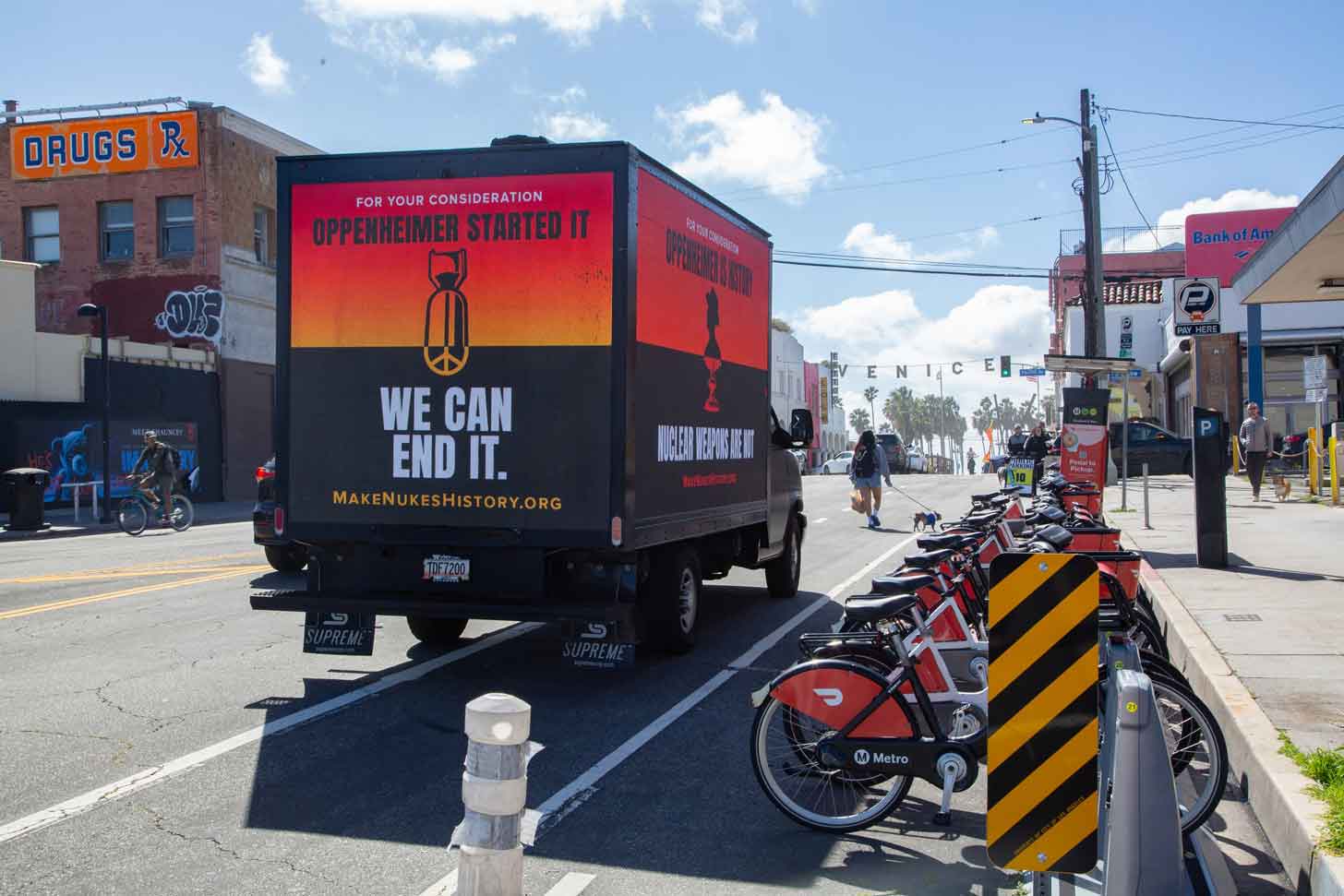Christopher Nolan’s box office smash “Oppenheimer” won big at the Academy Awards on Sunday, taking home the coveted title of “Best Picture,” among many other golden statues.
But the historical film is doing more than just gathering trophies; it has renewed a cultural conversation about nuclear weapons.
Prior to the big awards show this weekend, the Nuclear Threat Initiative, a global nonpartisan nonprofit aimed at reducing nuclear threats on humanity, launched a new public service campaign: Make Nukes History.
Its tagline? “For your consideration… ‘Oppenheimer’ is history. Nuclear weapons are not.”
The campaign focused on Los Angeles to drum up support prior to the Oscars, with billboards, and a large art installation. However, it has the potential to reach a global audience with increasing social media support and an open letter in the LA Times, which was co-signed by stars like Julianne Moore and Jane Fonda.
“As artists and advocates, we want to raise our voices to remind people that while Oppenheimer is history, nuclear weapons are not,” the letter reads. “At a time of great uncertainty, even one nuclear weapon – on land, under the sea, in the air, or in space – is too many.”

The campaign shares some startling statistics: Today, 13,000 nuclear weapons are held by nine countries — with some being 80 times more powerful than the ones created by Oppenheimer and his team.
While the film makes a clear point to illustrate Oppenheimer’s lifelong regret for his hand in creating the mass weapons that destroyed Hiroshima and Nagasaki in 1945, world leaders continue what could become a catastrophic nuclear arms race.
“Robert Oppenheimer warned against developing even more powerful weapons and predicted that dangerous arms races would follow. He was right,” NTI Co-Chair and CEO and former Secretary of Energy, Ernest J. Moniz, said in a statement.
“We face huge geopolitical challenges — but political will is needed to bring us back from the brink. And political will is created when people demand it.”
With protests against the killing of Palestinians making their way to the red carpet on Sunday, the Make Nukes History campaign is especially timely, bringing anti-war and nuclear disarmament activists into the mainstream.
“I know there are a lot of things we should probably do something about,” TikTok creator Austin Archer said in a video on Oscar Sunday. “This is one of them.”
Archer told a compelling narrative about the history of nuclear arms, weaving in plot devices from “Oppenheimer” itself and giving viewers a brief history lesson dating back to the Cold War, when anti-war activists successfully protested nuclear weaponry in the 1970s and 80s.
“The last time the world was facing a dangerous nuclear arms race, the people spoke up and were able to eliminate 80% of global nuclear arsenals,” Archer said. “Call it starry-eyed optimism or call it terrified desperation, but I think we can do that again.”

With the accelerated pace of the arms race — and the new vulnerability these weapons have to cyber attacks and artificial intelligence, folks like Archer — and even stars of the movie — know it’s time for change.
“I think it’s well past time for the world’s superpowers to admit that the entire species is much safer without these weapons,” Archer said.
And most people agree. According to a 2020 Chicago Council Survey, 66% of Americans believe that no country should be allowed to have nuclear weapons.
Additionally, 60% of Americans — from that same survey — said they were at least somewhat interested in learning more about U.S. nuclear weapon policy.
“Every person should be educated about the incredible destructive power of nuclear weapons,” ‘Oppenheimer’ actor Matthew Modine said in a statement. “Understanding the threat illuminates a necessary path toward their elimination.”
Beyond spreading awareness, the Make Nukes History campaign website includes a quiz for folks to “test their knowledge on nukes,” as well as an action guide, which prompts supporters to learn more, support communities harmed by nukes, and ensure they are registered to vote.
Once those steps are completed, supporters of the campaign can continue to check out content under the #MakeNukesHistory tag on social media, where they are certain to find a myriad of videos from activists and content creators alike.
They all drive home the same message: Oppenheimer started this, but we can end it.
In a sketch video posted to TikTok, comedian and creator Prance sarcastically, yet pointedly, asks his fellow movie-goers: “Eliminate nuclear weapons? What’s next — make the world a safe and equitable place for everyone?”
They reply, loudly and in unison: “Yes!”
Header images courtesy of Universal Pictures and Nuclear Threat Initiative



